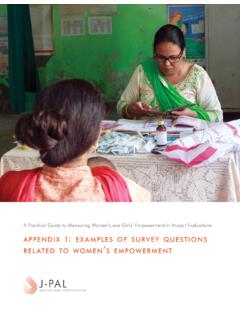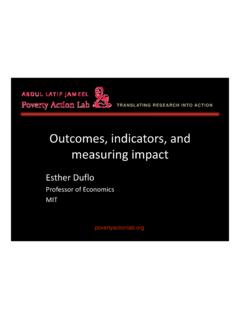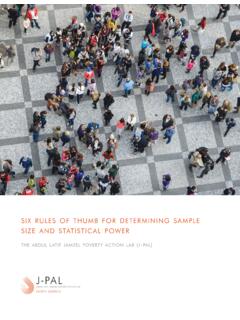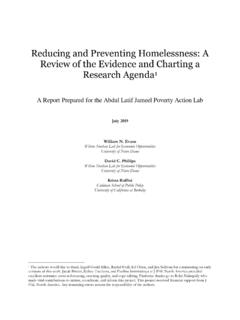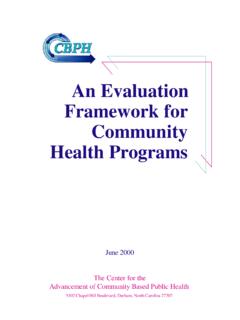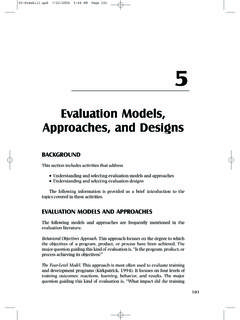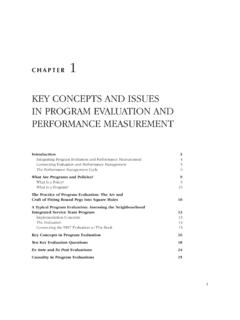Transcription of INTRODUCTION TO EVALUATIONS
1 RG 1 INTRODUCTION TO EVALUATIONS A Randomized evaluation is a type of Impact evaluation that uses random assignment to allocate resources, run programs , or apply policies as part of the study design. Like all impact EVALUATIONS , the main purpose of randomized EVALUATIONS is to determine whether a program has an impact, and more specifically, to quantify how large that impact is. Impact EVALUATIONS measure program effectiveness typically by comparing outcomes of those (individuals, communities, schools, etc.) who received the program against those who did not. There are many methods of doing this. But randomized EVALUATIONS are generally considered the most rigorous and, all else equal, produce the most accurate ( unbiased) results.
2 The methodology section covers the what, why, who, when, and how of randomized EVALUATIONS . For more resources on randomized EVALUATIONS , see: Running Randomized EVALUATIONS R. Glennerster and K. Takavarasha, November 2013 Field Experiments: Design, Analysis and Interpretation A. Gerber and D. Green, May 2012 Evaluating Social programs : Executive Education at J-PAL Lecture videos and course content from a past Executive Education Course A free online version of the course Using Randomization in Development Economics Research: A Toolkit E. Duflo, M. Kremer and R. Glennerster Randomized EVALUATIONS of Educational programs in Developing Countries: Some Lessons M.
3 Kremer Field Experiments in Development Economics E. Duflo, January 2006 Use of Randomization in the evaluation of Development Effectiveness E. Duflo and M. Kremer, July 2003 Scaling Up and evaluation E. Duflo, May 2003 Nonexperimental Versus Experimental Estimates of Earnings Impacts S. G lazerman, D. Levy and D. Myers, May 2003 Impact evaluation in Practice P. Gertler, S. Martinez, P. Premand, L. Rawlings and C. Vermeersh INTRODUCTION ABDUL LATIF JAMEEL POVE RTY A CTI ON LA B RG 2 T A BLE OF CONT ENTS 1. What is evaluation and Why Evaluate?.. 3 1 . A. W h y ev al ua t e? .. 3 What is ev aluation? .. 3 Needs Assessment .. 4 Program Theory Assessment.
4 4 Process ev aluation.. 5 Impact 7 Cost-Benefit/Effectiv eness/Comp arison Analysis.. 8 Goals, Outcomes and M ea su re men t s .. 8 2. What is randomization and why randomize?.. 9 What is randomization?.. 9 Why randomize?.. 10 When to conduct a randomized ev aluation?.. 12 When is a randomized ev aluation not appropriate?.. 12 3. How to conduct a randomized evaluation ?.. 14 Planning an ev aluation .. 14 How to design an ev aluation?.. 14 Who participates in an ev aluation? .. 19 How to implement?.. 20 How to obtain results?.. 21 How to draw policy implications? .. 22 4. H istor y of randomized .. 22 History of randomized ev aluations ..22 Who conducts randomized ev aluations.
5 24 INTRODUCTION ABDUL LATIF JAMEEL POVE RTY A CTI ON LA B RG 3 1. WHAT IS evaluation AND WHY EVA LUTE? . WHY EVA LUATE? The purpose of evaluation is not always clear, particularly for those who have watched surveys conducted, data entered, and then the ensuing reports filed away only to collect dust. This is most common when EVALUATIONS are imposed by others. If, on the other hand, those responsible for the day-to-day operations of a program have critical questions, EVALUATIONS can help find answers. As an example, the NGO responsible for distributing chlorine pills may speak with their local field staff and hear stories of households diligently using the pills, and occasionally see improvements in their health.
6 But each time it rains heavily, the clinics fill up with people suffering from diarrheal diseases. The NGO might wonder, if people are using chlorine to treat their water, why are they getting sick when it rains? Even if the water is more contaminated, the chlorine should kill all the bacteria. The NGO may wonder whether the chlorine pills are indeed effective at killing bacteria. Are people using it in the right proportion? Maybe our field staff is not telling us the truth. Perhaps the intended beneficiaries are not using the pills. Perhaps they aren t even receiving them. And then when confronted with this fact, the field staff claims that during the rains it is difficult to reach households and distribute pills.
7 Households, on the other hand, will reply that they most diligently use pills during the rains, and that the pills have helped them substantially. Speaking to individuals at different levels of the organization as well as to stakeholders can uncover many stories of what is going on. These stories can be the basis for theories. But plausible explanations are not the same thing as answers. EVALUATIONS involve developing hypotheses of what s going on, and then testing those hypotheses. WHA T I S EVA LUATION? The word evaluation can be interpreted quite broadly. It means different things to different people and organizations.
8 Engineers, for example, might evaluate or test the quality of a product design, the durability of a material, efficiency of a production process, or the safety of a bridge. Critics evaluate or review the quality of a restaurant, movie or book. A child psychologist may evaluate or assess the decision-making process of toddlers. The researchers at J-PAL evaluate social programs and policies designed to improve the well-being of the world s poor. This is known as program evaluation . Put simply, a program evaluation is meant to answer the question, how is our program or policy doing? This can have different implications depending on who is asking the question, and to whom they are talking.
9 For example, if a donor asks the NGO director how is our program doing? she may imply, have you been wasting our money? This can feel interrogatory. Alternatively, if a politician asks her constituents, how is our program doing? she could imply, is our program meeting your needs? How can we make it better for you? Program evaluation , therefore, can be associated with positive or negative sentiments, depending on whether it is motivated by a demand for accountability versus a desire to learn. J-PAL works with governments, NGOs, donors, and other partners who are more interested in learning the answer to the questions: How effective is our program?
10 This question can be answered through an impact evaluation . There are many methods of doing impact EVALUATIONS . But the one used by J-PAL is the randomized evaluation . At a very basic level, randomized evaluation can answer the question: was the program effective? But if thoughtfully designed and implemented, it can also answer the questions, how effective was it? Were there unintended side-effects? Who benefited most? Who was harmed? Why did it work or not work? What lessons can be applied to other contexts, or if the program was scaled up? How cost-effective was the program? INTRODUCTION ABDUL LATIF JAMEEL POVE RTY A CTI ON LA B RG 4 How does it compare to other programs designed to accomplish similar goals?
